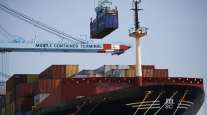Fleets Weigh Creating Pool to Run Intermodal Chassis
This story appears in the June 4 print edition of Transport Topics.
The Intermodal Motor Carriers Conference, dissatisfied with developments in the freight chassis business, is considering establishment of a trucker-based pool that would be the first of its kind, the conference’s executive director said.
Curtis Whalen, IMCC executive director, told Transport Topics that board members of the American Trucking Associations unit will review a report they commissioned earlier this year before making a decision in the next few weeks.
Drayage truckers, ocean carriers and shippers have been struggling to adjust to changes in the supply of truck-hauled wheeled platforms that are used to transport intermodal containers.
These chassis were provided at no charge until ocean carrier Maersk Line began charging a rental fee about three years ago. Some competitors followed Maersk’s lead but others didn’t and, as a result, Whalen said, “Everybody is still groping. Nobody is happy about where we are now.”
The ocean carriers’ exodus from the chassis business followed the Federal Motor Carrier Safety Administration’s implementation of a federal law that made providers of chassis responsible for the equipment’s condition when it was on the road.
Before the law was passed, truckers bore that burden, even though the equipment wasn’t theirs. The chassis, with the containers attached, are picked up by drayage carriers at intermodal transfer points.
Trucking interests pushed for the FMCSA action, which then set the other changes in motion as the ship lines sought ways to comply without having to bear the cost of chassis maintenance.
A draft of the report by consulting firm Tioga Group, comissioned by IMCC and provided to TT, said the current transition is “directionless” because of a lack of effective chassis maintenance, burdensome paperwork and no plan to replace the aging fleet of chassis, some of which are nearly 30 years old.
Tioga’s report also found “substantial agreement” that “motor carriers have the expertise to manage a chassis pool in a manner that is superior to current models.”
Whalen said the Tioga’s final report should be delivered to IMCC’s board in a matter of days.
Whalen also said he believes his group would decide to form a pool and will have to draw up a business plan to make that happen.
“The debate is not so much, ‘Do we move ahead,’ but ‘How do we move ahead and focus on a test site for a pool?’ ” Whalen said.
If the trucker group decides to establish a pool, Whalen said several issues in addition to funding will have to be addressed.
One of them is whether the ATA Board of Directors would have to agree before the conference could move ahead.
Another issue, Whalen said, would be antitrust considerations. Because of the commercial nature of the chassis issue, Whalen said, IMCC’s board is coming close to the need to have government approval to discuss the project among themselves.
That approval, known as a discussion agreement, already is in place for one of the pools that is run by a consortium of ship lines, the Consolidated Chassis Management chassis pool.
As the trucker group weighs its options, CCM is trying to attract new participants from the trucking industry to use its chassis fleet.
Phil Wojcik, president of CCM, said he’s trying to add members from the shipper or trucker community. No truckers are in CCM’s pool, which has about 135,000 chassis.
Efforts to recruit shippers and truckers to CCM have suffered because of “a lack of communication” with them about the pool’s goal of maintaining a supply of chassis that pays for itself.
Members of the CCM pool contribute chassis and use each other’s equipment. Costs of operating the pool are allocated based on usage of each member’s equipment.
The ocean carriers’ pool also could face some regulatory issues if new members are added.
Wojcik said the group has to decide whether to seek amendments to its discussion agreement, which was issued by the Federal Maritime Commission.
The amendments would be needed to allow truckers or shippers to participate, he said.
The board of the Ocean Carrier Equipment Management Association, CCM’s parent, would have to approve a request to the federal agency for an amendment, Wojcik said.
Another reason why no truckers have joined CCM’s pool, Wojcik said, is that the pool’s current cost-allocation rules put a financial burden on small truckers, discouraging them from joining.




